Is your child struggling with constipation?
Then you are probably looking for safe and natural laxatives for kids with constipation.
In this comprehensive blog post, we unveil the power of natural laxatives for kids, providing gentle and holistic approaches to relieve hard and painful stools.
Here, you’ll discover a treasure trove of natural remedies and foods that actively promote healthy bowel movements in children.
From incorporating fibre-rich foods to implementing hydration strategies, we’ll explore tried-and-true methods supported by expert advice.
Bid farewell to discomfort as you embrace a natural path towards regularity for your little one. Unlock the secrets of natural laxatives for constipation relief and actively restore their digestive wellness.
Signs of constipation in kids
Recognising the signs of constipation in kids is vital for proactive parental intervention.
Watch out for key indicators such as:
- infrequent or painful bowel movements
- hard or dry stools
- Soiling on underwear
- With complaints of tummy pain or discomfort.
Children may also show changes in their mood like irritability or reduced appetite when constipated.
By staying vigilant for these telltale signs, you can address constipation early and help them find relief.
Keep a close eye on your child’s bowel habits and take action promptly if you notice any of these symptoms.

Causes of constipation in kids
Several factors can contribute to constipation in kids.
Common causes include:
- Picky Eating: When children eat a limited variety of foods or not enough solid foods, it can increase the risk of constipation in kids.
- Lack of Fibre: When children don’t eat enough fibre-rich foods like fruits, vegetables and whole grains, it can slow down bowel movements and contribute to constipation.
- Poor Muscle Tone: Weakness in the muscles responsible for proper bowel movements can hinder bowel regularity.
- Inadequate Fluid Intake: Not drinking enough fluids, especially water, can result in hardening of stools and difficulty passing soft regular stools.
- Not Enough Daily Exercise/Movement: A sedentary lifestyle without enough physical activity can affect bowel movements and contribute to constipation.
- Holding It In: Some children may intentionally withhold bowel movements, often due to fear or discomfort, leading to constipation.
- Undiagnosed IBS: Some children may have undiagnosed Irritable Bowel Syndrome (IBS), a condition that can present constipation as one of its symptoms.
- Non-IgE Mediated CMPA in Infants: In some cases, constipation can be one of the symptoms of non-IgE mediated Cow’s Milk Protein Allergy (CMPA) in infants.
By actively addressing these potential causes and making necessary lifestyle changes, parents can play an essential role in alleviating constipation in their children and promoting healthy digestion.
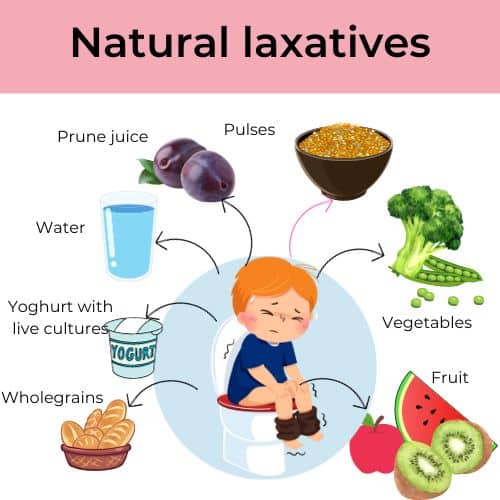
Natural laxatives for children
If your doctor has prescribed laxatives to treat your child’s constipation you may be looking to understand the role of natural laxatives for kids.
It’s always recommended to try to address the underlying causes of constipation, especially any that are easily fixed using nutrition and lifestyle advice.
Keep reading to find out examples of home remedies for constipation in kids.
Steps to constipation relief for kids (using natural laxatives for kids)
Quick Relief Strategies for Kids’ Constipation
When seeking kids constipation quick relief, time is of the essence.
For a quick solution to ease your child’s discomfort, consider the following age-specific advice:
Home Remedies for Constipation in a 5-Year-Old
For children around five years old, gentle belly massages and encouraging certain poses like the ‘knee-to-chest’ can be effective natural laxatives for kids.
Offering a warm bath can also help relax their muscles and promote bowel movement.
2-Year Old Constipation Instant Relief
For toddlers, the approach needs to be gentle.
Warm baths, along with a light belly rub, can provide comfort. Offering a small amount of prune juice can also be effective.
4-Year Old Constipation Instant Relief
Four-year-olds may benefit from a combination of physical activities like jumping, and dancing, and a diet rich in fibre, like whole wheat toast or applesauce.
In this section, we’ll explore the quickest way to relieve a kid’s constipation with real foods.
With these home constipation remedies, you’ll have plenty of ideas to tackle hard and painful stools.

How to make a kid poop fast home remedies (natural laxatives)
Increase fibre – Boost your child’s fibre intake by adding more whole grains, fruits (at-home remedies for constipation include prunes and pears), and vegetables to their diet. These foods help soften stools and help their bowels move regularly.
Encourage water – Make sure your little one drinks plenty of water throughout the day. Good fluid intake is one of the secret ingredients for a happy tummy and should be included as part of any at-home remedies for constipation. For further tips, see 7 Ways To Get Your Toddler To Drink Water.
Promote Physical Activity – Encourage some daily playtime. Think of it as a fun way to relieve constipation. Movement stimulates the digestive system and makes sure and can play an important role in preventing chronic constipation.
Establish a Routine – Help your child establish a regular bathroom schedule. Encourage them to use the toilet at the same time each day, either before or after meals, so toileting becomes part of their routine.
Try Probiotics – Probiotics can be an inexpensive and ‘low-risk’ approach to improving your child’s overall gut health. If you decide to try a probiotic, give a well-researched brand and strain for at least four weeks. Learn more in this masterclass: Probiotics for Thriving Kids.
Improve Sleep – Make sure your child gets sufficient sleep, as rest is crucial for overall gut health, including proper digestion.
Perform Abdominal Massage – Gently massage your child’s abdomen in a clockwise direction to stimulate the digestive tract and relieve constipation.
The above are great home remedies on constipation that you can adopt as part of your child’s healthy eating plan.

Foods that help relieve constipation in kids
See below for a list of some of the best foods for constipated kids.

Encourage prebiotic foods – prebiotic foods are rich in fibre that feeds the good bacteria in the gut to encourage microbiome diversity. Foods that contain prebiotics are bananas, chickpeas, lentils, onions and leeks, oats, and some wholegrains (including wheat and rye) to list a few.
Prune Power – Prune juice is one of nature’s plumbers and one of the most popular child constipation remedies for quick relief. As a natural laxative, you can serve it in small quantities to soften stools effectively. However, this is a source of ‘free sugars’ so use it sparingly. Try not to rely on this as the main home remedies for constipation.
Sorbitol Rich Foods – Incorporate fruits like apples, pears, peaches and cherries into their diet for kid’s constipation relief. These fruits contain sorbitol, a natural sugar alcohol that acts like a mild laxative.
Give Kiwifruit – Kiwi is an excellent at-home remedy and natural stool softener for constipation. I’d say it’s the best laxative for kids!
Try chopping up a kiwifruit and offer it with their breakfast porridge.
The natural laxative effect of kiwifruit documented in randomised controlled trials (see review by Eltorki et al, 2022), is linked to its high fibre and water-holding capacity, as well as an enzyme called actinidin which may improve gut motility.
Kiwifruit added to a smoothie is one example of excellent remedies for constipation for toddler.
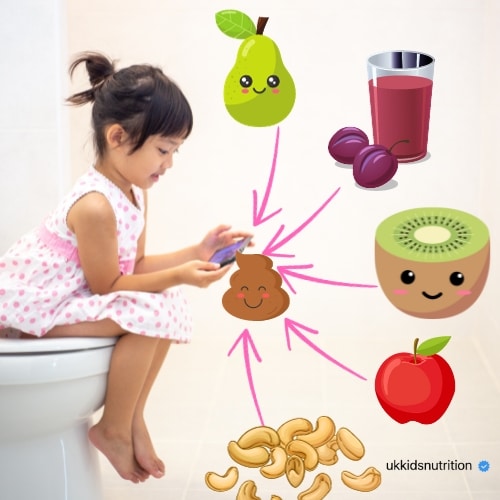
Nuts and Seeds as Natural Laxatives for Kids
Use Ground Flaxseeds – Sprinkle ground flaxseeds on cereal or mix them into yoghurt. They provide a good source of fibre, aiding in regularity.
Include nuts & seeds – nuts and seeds are another delicious fibre-rich food that can help add bulk to stools whilst improving transit time for toddler constipation. Use it in baking or as a tasty after-school snack for school-aged children.
Role of Dairy as Natural Laxative for Kids
Yoghurt with live cultures – Dairy products like yoghurt can be a useful source of calcium and protein in children’s diets.
Currently, there isn’t sufficient evidence that cutting out dairy products will provide constipation relief for kids.
Yoghurt and kefir for kids with live cultures can be used to support a healthy gut and normal digestive health.
So unless your child has been diagnosed with a cow’s milk protein allergy, there’s no need to avoid dairy products.
Opt for Wholegrain Cereals – Choose high-fibre whole wheat pasta, bread and whole grain breakfast cereals, checking labels for fibre content. You can learn more about screening breakfast cereals here so that you choose the right brands for constipation relief for children.
How to Make a Kid Poop Fast
In situations where you need to know how to make a kid poop fast, consider the following:
- Encourage your child to engage in active play, which can naturally stimulate the digestive system.
- Offer foods known for their natural laxative effects, like prunes or kiwifruit.
Best Laxative for Kids
While natural methods are preferred, sometimes the prescribed laxatives might be necessary.
In such cases, consult with your paediatrician to find a gentle yet effective option suitable for your child’s age and health.
Are probiotics good for constipated kids?
Probiotics can be a useful, natural and relatively inexpensive therapy for kids constipation.
Whilst on its own it may not be sufficient to ‘cure’ constipation, it can improve symptoms such as IBS-related bloating or abdominal pain.
Not all probiotics are the same and many probiotic products are not regulated. For this reason, choose strains that have been studied in children and shown to help relieve symptoms of constipation in children.
For more information on recommended probiotics in children, see my Masterclass: Probiotics for Thriving Kids.
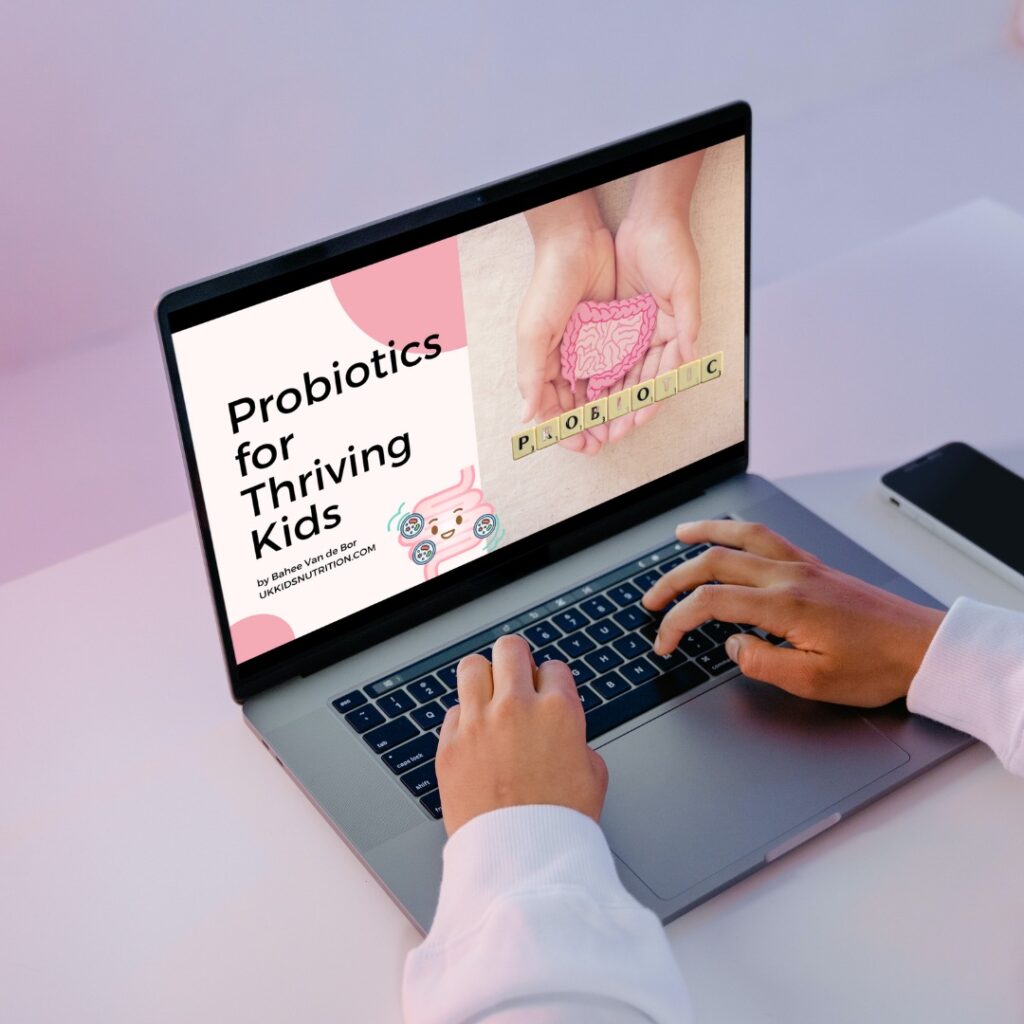
How can I soften my kid’s stool naturally?
Fibre foods are a key nutrient lacking in many children’s diets despite being one of the key natural remedies for constipation.
It is abundant in most fruits and vegetables as well as whole grains, nuts, seeds, pulses and other plant foods.
Fibre is an excellent nutrient that can soften stools naturally so encourage your child to eat a good variety of fibre-rich foods every day.
How much fibre do children need per day?
Transitioning from discussing various natural laxatives for kids, it’s important to consider the role of dietary fibre, a key component in managing constipation.
The SACN 2015 Carbohydrates and Health report provides clear guidelines on how much fibre children should consume daily.
Notably, a good fibre intake positively impacts blood cholesterol levels and colorectal function.
There are no specific fibre requirements for babies and children under two years.
Despite this, the aim is to introduce a variety of whole grains, pulses, fruits, and vegetables starting from six months to promote regular bowel movements.
In the realm of home remedies for constipation in toddlers and older children, the crucial first step is assessing whether they’re meeting these fibre targets.
Achieving daily fibre goals is a fundamental aspect of using fibre as a natural laxative for kids
Table 1.0 Fibre requirements per age
Ensuring your child meets their daily fibre needs is crucial for preventing and relieving constipation. Refer to the following table for age-specific fibre recommendations as outlined in the SACN 2015 Carbohydrates and Health report:
| Age (years) | Fibre requirements per age (grams per day) |
| 2-5 | 15g |
| 5-11 | 20g |
| 11-16 | 25g |
| 16-18 (adolescents) | 30g |
Use this table as a guide to determine the appropriate amount of fibre for your child.
For example, a 7-year-old child would require approximately 20g of fibre per day.
A balanced intake of fibre-rich foods can significantly improve bowel health and regularity.
Foods to Avoid for Quick Constipation Relief
- Limit bran intake, as it can worsen constipation in some kids.
- Avoid high-sugar, low-fiber snacks. Opt for plant-based alternatives.
How to Make Your Toddler Poop Instantly
For instant relief from toddler constipation, hydration is key.
Ensure your toddler is drinking plenty of water throughout the day. A small serving of prune juice can also act as a quick natural laxative.
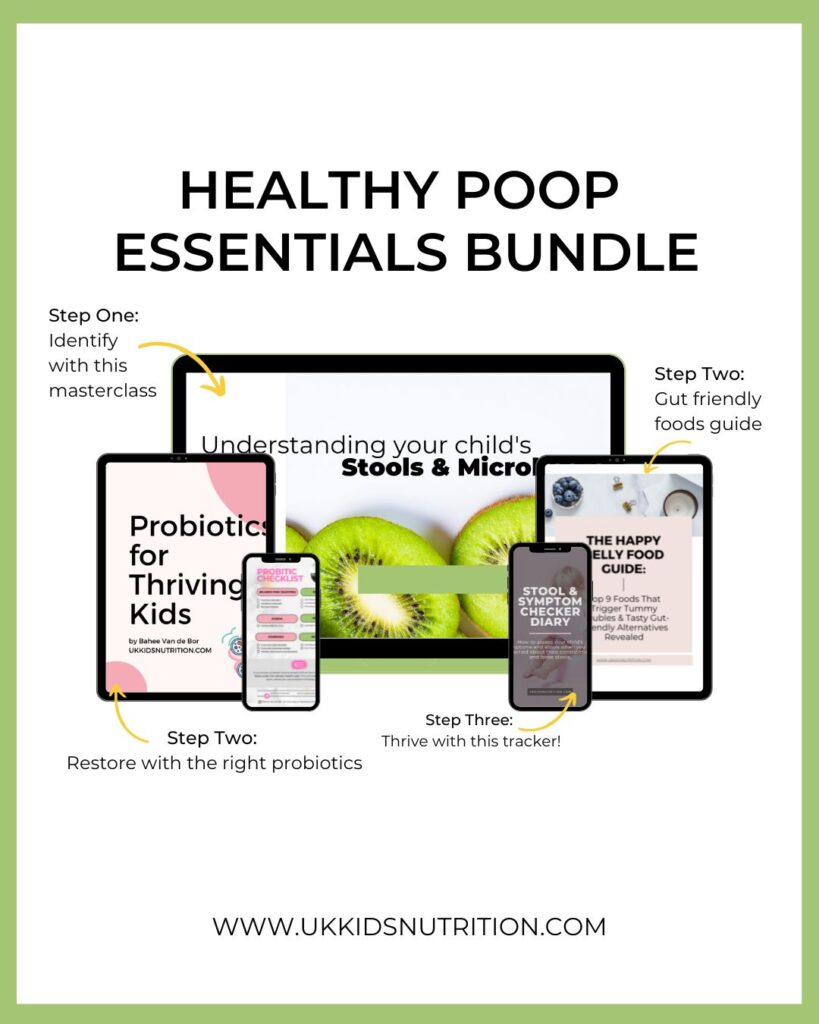
Children with severe constipation
If your child struggles with severe constipation, it may be worthwhile starting a laxative available on prescription, alongside natural laxatives for kids.
Some children with ongoing tummy pain and constipation may have irritable bowel syndrome.
Learn more in Is The Low FODMAP Diet for Constipation Effective in Children?
Constipation in Children: When to Worry
While constipation in children is usually not a cause for concern, there are times when you should seek medical advice.
If your child experiences severe abdominal pain, blood in the stool, or constipation lasting longer than two weeks, it’s important to consult a doctor.
These signs could indicate a more serious underlying condition that needs immediate attention.

Bottomline
By recognizing signs early and adjusting diet and lifestyle, most constipation and digestive issues in kids can be managed naturally. It’s crucial to monitor their symptoms and consult a healthcare professional for persistent or severe cases.

Let Me Help
If you’re seeking more personalised guidance or in-depth information, consider exploring my specialized programs and resources:
- Online Course: “Get Kids Pooping Painfree” – This comprehensive course offers detailed strategies and insights to alleviate constipation and related discomfort in children.
- 1-2-1 Programme: “IBS Kids Mastery Method” – Tailored for individual needs, this program provides one-on-one support to master the challenges of IBS in kids.
- FREE Guide: Don’t miss out on the valuable insights in “Heal Tummies With Smart Snacks.” Download this free guide to start making positive changes today.
- CHAT With Bahee: Book a free initial consultation to discuss the Happy Belly Club.
Each of these resources is designed to empower you with the knowledge you need to support your child’s gut health.

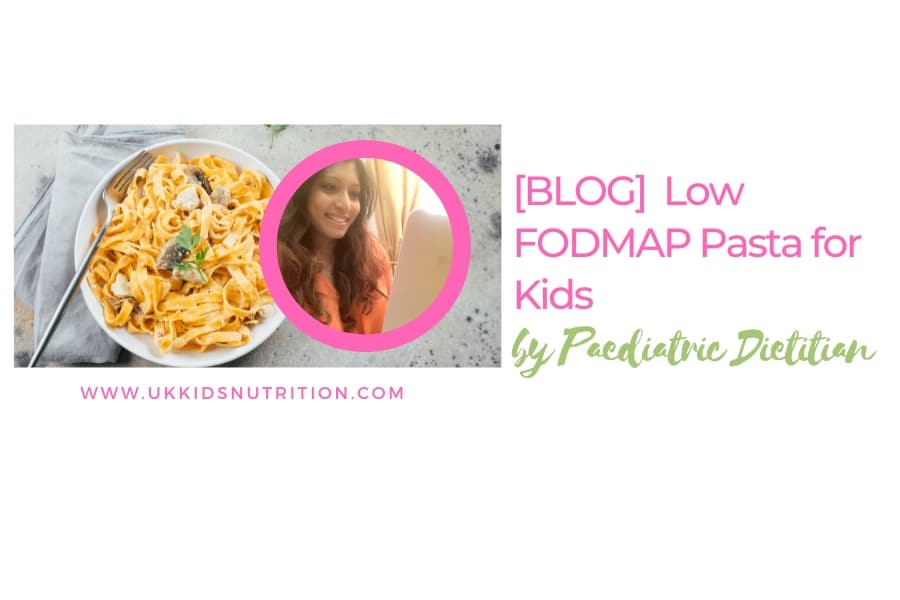


One thought on “Natural Laxatives for Kids with Constipation”
Hello
I was googling for content about Natural Laxatives For Kids When I came across your excellent resource page.
I just wanted to say that your page helped me, I would have found an excellent resource.
Either way, thanks for putting together your list of resources. Have a great day.